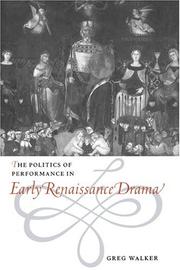| Listing 1 - 2 of 2 |
Sort by
|
Book
ISBN: 9780198851516 0198851510 0191886114 0192592297 0192592300 Year: 2020 Publisher: Oxford Oxford University Press
Abstract | Keywords | Export | Availability | Bookmark
 Loading...
Loading...Choose an application
- Reference Manager
- EndNote
- RefWorks (Direct export to RefWorks)
John Heywood was an important literary and theatrical pioneer in his own right, but he is also a revealing lens through which to view the wider tumultuous history of the sixteenth century. He was, through the period from the mid-1520s to the 1560s, as near to a celebrity as Tudor England possessed, famed for his 'merry' persona and good humour. But his public image concealed a deeper engagement with religious and political history. Enduringly resistant to extremism, he variously entertained, counselled, and cautioned his readers and audiences through four reigns, finding himself, as regimes changed and religious policies shifted, successively celebrated, marginalised, anathematised, condemned to death, recuperated, and celebrated once more before finally retreating into exile on the Continent in 1564. He produced plays at the courts of Henry VIII, Edward VI, Mary and Elizabeth, performed and taught keyboard music, wrote lyric poetry and songs, and from the mid-sixteenth century turned to collecting and publishing highly successful volumes of proverbs and epigrams for which he was remembered well into the seventeenth century. Each of these works provides a subtle, often courageously critical engagement with the politics of its moment. To study Heywood's career takes us beyond the cliches of popular history, beyond Shakespeare and the Elizabethan playhouses, beyond the canonical Henrician court poets and the writers of the Elizabethan 'Golden Age', beyond even the experiences of the century's chief ministers, intellectuals, and martyrs, to a theatrical and literary world less visible in the conventional sources. It opens a window on a culture in which the actions of monarchs, their councillors, and their victims were witnessed and reflected upon at one remove from the centres of power.
Heywood, John --- Heywood, John, --- Heywoode, John, --- Heiwood, John, --- Heywoode, Jhon, --- Heywood, J. --- Haywood, John, --- Haywoode, John, --- Heywod, John, --- Criticism and interpretation.

ISBN: 051158315X 0511005113 9780511005114 9780511583155 0521563313 9780521563314 9780521029919 0521029910 9780521029919 Year: 1998 Publisher: Cambridge : Cambridge University Press,
Abstract | Keywords | Export | Availability | Bookmark
 Loading...
Loading...Choose an application
- Reference Manager
- EndNote
- RefWorks (Direct export to RefWorks)
Greg Walker provides a new account of the relationship between politics and drama in the turbulent period from the accession of Henry VIII to the reign of Elizabeth I. Building upon ideas first developed in Plays of Persuasion (1991), he focuses on political drama in both England and Scotland, exploring the complex relationships between politics, court culture and dramatic composition, performance and publication. Through a detailed analysis of one central dramatic form, the interlude or great hall play, and close study of key texts, Walker examines drama produced and adapted for varying conditions of performance: indoor and outdoor, private and public. He examines what happened when the play script was printed and sold commercially as a literary commodity. This interdisciplinary analysis will find a market among Tudor historians as well as students of medieval and Renaissance drama.
Political and social views. --- English drama --- Theater --- Politics and literature --- Political plays, English --- Renaissance --- History and criticism. --- Political aspects --- History --- Lindsay, David, --- Heywood, John, --- Udall, Nicholas, --- Norton, Thomas, --- Great Britain --- Politics and government --- Dramatics --- Histrionics --- Professional theater --- Stage --- Theatre --- Performing arts --- Acting --- Actors --- Revival of letters --- Civilization --- History, Modern --- Civilization, Medieval --- Civilization, Modern --- Humanism --- Middle Ages --- Heywoode, John, --- Heiwood, John, --- Heywoode, Jhon, --- Heywood, J. --- Haywood, John, --- Haywoode, John, --- Heywod, John, --- Arts and Humanities --- Literature
| Listing 1 - 2 of 2 |
Sort by
|

 Search
Search Feedback
Feedback About UniCat
About UniCat  Help
Help News
News